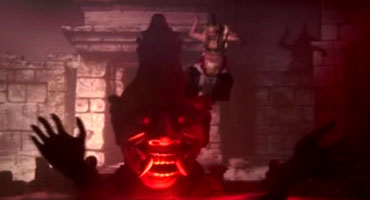
 I agree
I agree
.
Jabang Tetuko [The Baby Tetuko] (2011)
Director: Mirwan Suwarso
How to cite: Mirwan Suwarso ([2011] 2016), Jabang Tetuko [The Baby Tetuko], translation and notes by Miguel Escobar Varela, Egbert Wits and Yosephin Novi Marginingrum. Singapore: Contemporary Wayang Archive. Retrieved from http://cwa-web.org/en/JabangTetuko.
Summary
The giant Kalapracona wants to marry the heavenly fairy Supraba. When his request is denied, he decides to attack the heavens. Meanwhile, Bima's wife Arimbi has given birth to Jabang Tetuko. His umbilical cord is so strong that even the strongest metal cannot cut through it. The Gods offer the sheath of the magical sword, Kunta, to Bima in order to cut the umbilical cord. In exchange, the baby will need to fight the giants who are attacking the heavens. The baby is killed by the giants. The Gods revive him by throwing him into a volcanic crater together with powerful weapons. The baby reemerges as an almost indestructible child, who singlehandedly defeats the giants and kills Kalapracona.
Story: Mahabharata
Music: Pop, Rock, Incidental Music
Space: Video Screen, Proscenium Stage
Performers: Actors
Puppets: Wayang Kulit Puppets
Language: Indonesian
Recording details
Notes: Performed on 9 July 2011.
Produced by: MSP Entertainment and Djarum Foundation
Recording place: The Hall, Senayan City, Jakarta
Addional credits
Scriptwriter and director: Mirwan Suwarso
Dalang: Agus Sambowo
Assistant director: Jojo Replace
Scriptwriter and songwriter: Fisca Galih
Music composer: Deane Ogden
Assistant music composer: Indra Perkasa
Voice director: Andre Supryanata
Choir coordinator: Mian Muthia
Movement coordinator: Benjamin Rowe
Dance coordinator: Yudi Bharata
Tetuko: Fajar Laksono
Gatotkaca: Yudi Bharata
Bimasena: Herman Jack
Dewi Arimbi: Mian Muthia
Kala Pracona: Nanang Ruswandi
Bgara Guru: Teguh Amprianto
Batara Narada: Sutiyo B
Batara Surya: Yori
Batara Indra: Trindil
Batara Brahma: Budiman
Batara Bayu: Budiono
Prabu Krensa: Sukirman
Semar: Yunus
Arjuna: Aryo Saloko
Surya Putra: Agung P. Widodo
Sekipu: Sentot Erwin
Prajurit: Sukri, Didit, Koko, Adi
Prajurit / Wushu: Ahmad Hulaefi, David Hendrawan, M. Abdul Haris, Erwein Wujayanto, Slamet Riswanto, Arnold Lukito, Reza Pratmoko, Tommy Koeswoto, Raden Karisma
Violin I: Liliek Jasqee
Violin II: Eci
Viola: Rival
Cello: Anton
Guitar: Eink
Bass: Kuple
Keboard: Rieke, Gomes
Perkusi: Yose, Wasis
Suling: Herry, Dedi Voices
Gaffer: Wan Arif
Assistant Cameraman: Arnand
Set designer: Moh. Ola Rmadhani
Decoration: Citra Andika, Irvan Novierde, Agung, Sutoyo Lumbir
Production Designer: Firman Ibrahim
Assistant Production Designer: Tesza Dewayani
Stage Manager: Giovani Tomodok
Light designer: Iskandar Loedin
Graphic design: Rizki Tri Kunrianto, Reno Rezkan
Diorama design: Gegi - Dioking
PR and Marketing: Vrina Sorya Wijaya
Finance: Sjenniaty Then
Administration: Arief Puji, Andy Rachmadsyah
Marketing: Graffindo
View the metadata record for this resource.
Translation and notes by Miguel Escobar Varela (MEV), Egbert Wits (EW) and Yosephin Novi Marginingrum(YNM).
1. Jabang Tetuko (Tětuka in Javanese) is the name Gatokaca had as a child YNM.
2. Negeri kita [our country], can be better translated as Indonesia EW.
3. Khazanah treasure YNM.
4. Sugěng mirsani [happy viewing] is a Javanese expression conventionally uttered before a performance MEV.
5. Marcapada is the world of the mortals in wayang MEV.
6. Dewi Saraswati is the goddess of science and art YNM.
7. Kalapracona is a giant king, renowned for his magical powers YNM.
8. Batara Guru Shiva is one of the main Gods in the wayang tradition MEV.
9. The God pictured here is not Batara Guru, but Batara Narada, a God that tends to speak in impolite and harsh ways, often mocking other Gods MEV.
10. This phrase mocks the typical reaction of Indonesian politicians typical to interview questions EW.
11. Tersebutlah [once upon a time] is a traditional way of starting a story EW.
12. Jagad Triloka [the three worlds] refers to the unity of the upper, middle and lower worlds MEV.
13. Bidadari could also be translated as angel or goddess MEV.
14. Here, the performers switch to Javanese.
15. Pondhong [to carry above one self with both hands] is often used to describe the way a bride is carried by her father and uncles in a royal wedding YNM.
16. These lines correspond to a fragment from the Asmaradana Gubahan song, written by Yasapidupra I. This fragment has been incorporated into several popular songs, such as Ladrang Asmaradana and Langgam Dadi Ati. The full fragment is gĕgaraning wong akrami, dudu banda dudu rupa, amung ati pawitané, luput pisan kĕna pisan, lamun gampang luwih gampang, yèn angèl angèl kĕlangkung, tan kĕna tinumbas arta, which means "that which keeps a household together is not a shape and it is not money, it is the heart which keeps it together, sometimes we will fail and sometimes we will succeed, that which is easy will feel even easier, and that which is hard will feel even harder, these things cannot be bought with money" YNM.
17. Kalapracona is lost in a daydream, and Sekipu admonishes him to think about the fact that Supraba is not yet with him YNM.
18. "Panji" [long flag] YNM.
19. This expression, which implies the preparation to get ready for work, is also used in Wayang Hip Hop MEV.
20. Trĕnggana star YNM.
21. Marcapada is the world of the humans MEV.
22. The Kunta weapon is the most powerful weapon of the Gods MEV.
23. Suryaputra is another name for Karna, Kunti's first son MEV.
24. A pusaka [heirloom or amulet] is a sacred weapon. In this case, Bima is referring to the nail of his right hand, which is called Pancanaka MEV.
25. Batara Surya is the God of the sun MEV.
26. Arjuna refers to himself as hamba slave. Lowering one's status and referring to oneself as a slave is a sign of politeness MEV.
27. Bokong means buttocks, so the more literal translation would be "my ass" EW.
28. Sate is a traditional Indonesian dish which consists of small pieces of meat cooked on a skewer, served with rice MEV.
29. Oglak shake is a Javanese word used here in the middle of an Indonesian sentence EW.
30. Batara Guru is shown as a conventional wayang puppet in the background MEV.
31. Gatotkaca's mother, Arimbi, is herself a giant MEV.
32. Wédang jahé is a traditional warm drink, made of ginger EW.
The honorifics in the original languages were retained in the subtitles. In Javanese and Indonesian, speakers address their interlocutors with over 40 different honorifics which denote differences in their relative status and level of intimacy.
ID = Indonesian
JW = Javanese
Adik. ID. Younger brother/sister. It is used for addressing younger people, not necessarily one's relatives.
Adinda. ID. Younger sister. More intimate than adik.
Babé. ID/Betawi. Familiar form of father, commonly used in Jakarta.
Bé. ID/Betawi. Short form of Babé, father. Jakartan slang.
Bang. ID. Older brother, short form of abang. If used with non-relatives, it is has the connotation of a slang, and is somewhat equivalent to “man” in English.
Bĕndara. JW. Master.
Bibi. JW/ID. Aunt. A way of addressing/referring to older women.
Bos. ID/JW. An adaptation of the English "boss". Used either to refer to one's superior or to a friend in a joking context, for example, when a person orders others around without realizing he/she is doing so.
Bu. ID/JW. Short form of ibu, mother.
Bung. ID. Similar to bang, but slightly less formal. It might mean "comrade". The political leaders of the independence war are often referred to with this term, for example Sukarno is often referred to as
Bung Karno.
Dara. JW. Short form of bĕndara, master.
Dèn. JW. Sir, master, used to address royalty. Short form of radèn.
Dhé. JW. Short form of pakdhé, uncle.
Dhik. JW. Short form of adhik. Younger brother/sister. It is used for addressing younger people, not necessarily one's relatives.
Éyang. JW. Grandfather.
Dimas. JW. Younger brother.
Gusti. JW. Lord. Used to address superiors and Gods.
Ibu. JW/ID. Mother. Used generically to address women who are older than the speaker.
Kakang. JW. Older brother.
Kakang mbok. JW. Older sister.
Kanda. ID. Older brother. Formal.
Kang. JW. Older brother. Informal.
Kangmas. JW. Older brother.
Kaki. JW. Uncle
Kang. JW. Older brother, used generically for men older than the speaker. It is a shortened version of kangmas).
Kakak. JW/ID. Older brother/sister, used generically for people who are older than the speaker.
Lé. JW. Son, short version of tholé.
Lik. JW. Often used between friends as a slang term of address. Uncle, "little father." Short form of {paklik}.
Ma. JW. Same as pak, short form of rama.
Mbak. JW/ID. Older sister. Used generically for women who are slightly older than the speaker.
Mamang. ID. Uncle.
Mang. ID. Uncle, short form of mamang.
Mas. ID. Older brother, used generically for men who are older than the speaker. Although it is also a shortened version of the Javanese kangmas people prefer to use mas in Indonesian and kang in Javanese.
Mas bro. ID. Slang used among male friends. In a way, it is a reduplication.
Mbah. JW/ID Grandfather, grandmother. It is used generically to address people who are much older than the speaker. Short form of simbah.
Mbok. JW. Mother, short form of simbok. Used generically for women who are older than the speaker.
Mbokdhé. JW. Aunt. Literally, "big mother".
Mbul. JW. Informal term of address between close male friends.
Ndara. JW. Master.
Nduk. JW. Daughter, short form of gĕndhuk.
Nggèr. JW. Son, short form of anggèr Used generically for people who are younger than the speaker, with whom the speaker is on intimate terms.
Nimas. JW. Younger sister.
Nok. JW. West Javanese term for daughter, short form of dhénok.
Nona. ID. Miss, unmarried woman.
Paduka. ID. Your Excellency.
Pak. JW/ID. Father, used generically for men who are older than the speaker.
Pakdhé. JW. Uncle. Used to refer to a man who is older than one's father.
Paman. ID. Uncle. Used to refer to a man who is older than one's father.
Pangéran. JW/ID. Prince.
Prabu. JW. King.
Radén. JW. Master, used for royalty.
Rama. JW. Father. It can also be used to designate catholic priests when one is speaking in Indonesian.
Simbah. JW/ID Grandfather, grandmother. It is used generically to address people who are much older than the speaker.
Sinuwun. JW. Very formal way to address a man, reserved for sultans, kings and Gods.
Siwa. JW. Term for addressing older people.
Siwak. JW. Same as Siwa. Term for addressing older people.
Tholé. JW. Son
Tuan. ID. In colonial contexts, this is the way foreigners are addressed but it can also mean sir.
Wa Nĕrpati. JW. Uncle king, equivalent to the Indonesian paman raja.
Wa. JW. For addressing older people, short form of siwa.
Yayi. JW. Younger brother/sister.
Yunda. JW. Older sister.
See the Translation conventions.
Share:
in the translations or data.
